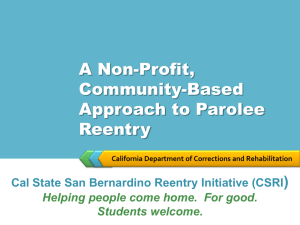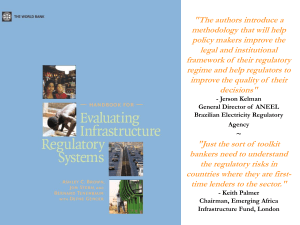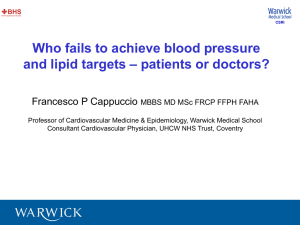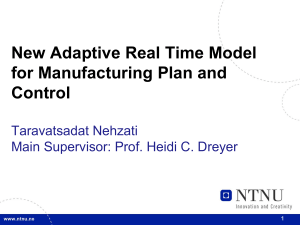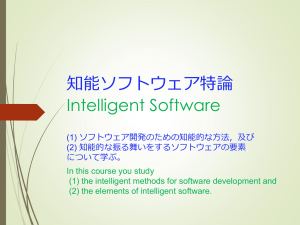The Computer Science Research Institute (CSRI) at Ulster CSRI was
advertisement
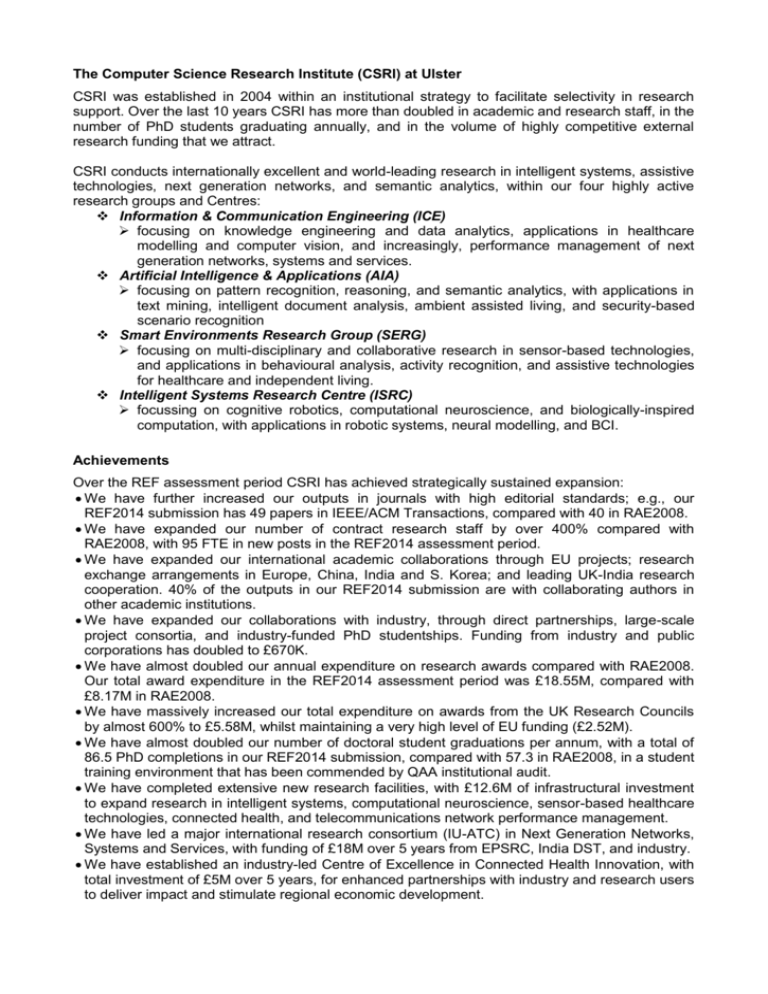
The Computer Science Research Institute (CSRI) at Ulster CSRI was established in 2004 within an institutional strategy to facilitate selectivity in research support. Over the last 10 years CSRI has more than doubled in academic and research staff, in the number of PhD students graduating annually, and in the volume of highly competitive external research funding that we attract. CSRI conducts internationally excellent and world-leading research in intelligent systems, assistive technologies, next generation networks, and semantic analytics, within our four highly active research groups and Centres: Information & Communication Engineering (ICE) focusing on knowledge engineering and data analytics, applications in healthcare modelling and computer vision, and increasingly, performance management of next generation networks, systems and services. Artificial Intelligence & Applications (AIA) focusing on pattern recognition, reasoning, and semantic analytics, with applications in text mining, intelligent document analysis, ambient assisted living, and security-based scenario recognition Smart Environments Research Group (SERG) focusing on multi-disciplinary and collaborative research in sensor-based technologies, and applications in behavioural analysis, activity recognition, and assistive technologies for healthcare and independent living. Intelligent Systems Research Centre (ISRC) focussing on cognitive robotics, computational neuroscience, and biologically-inspired computation, with applications in robotic systems, neural modelling, and BCI. Achievements Over the REF assessment period CSRI has achieved strategically sustained expansion: We have further increased our outputs in journals with high editorial standards; e.g., our REF2014 submission has 49 papers in IEEE/ACM Transactions, compared with 40 in RAE2008. We have expanded our number of contract research staff by over 400% compared with RAE2008, with 95 FTE in new posts in the REF2014 assessment period. We have expanded our international academic collaborations through EU projects; research exchange arrangements in Europe, China, India and S. Korea; and leading UK-India research cooperation. 40% of the outputs in our REF2014 submission are with collaborating authors in other academic institutions. We have expanded our collaborations with industry, through direct partnerships, large-scale project consortia, and industry-funded PhD studentships. Funding from industry and public corporations has doubled to £670K. We have almost doubled our annual expenditure on research awards compared with RAE2008. Our total award expenditure in the REF2014 assessment period was £18.55M, compared with £8.17M in RAE2008. We have massively increased our total expenditure on awards from the UK Research Councils by almost 600% to £5.58M, whilst maintaining a very high level of EU funding (£2.52M). We have almost doubled our number of doctoral student graduations per annum, with a total of 86.5 PhD completions in our REF2014 submission, compared with 57.3 in RAE2008, in a student training environment that has been commended by QAA institutional audit. We have completed extensive new research facilities, with £12.6M of infrastructural investment to expand research in intelligent systems, computational neuroscience, sensor-based healthcare technologies, connected health, and telecommunications network performance management. We have led a major international research consortium (IU-ATC) in Next Generation Networks, Systems and Services, with funding of £18M over 5 years from EPSRC, India DST, and industry. We have established an industry-led Centre of Excellence in Connected Health Innovation, with total investment of £5M over 5 years, for enhanced partnerships with industry and research users to deliver impact and stimulate regional economic development. CSRI is also implementing plans to embed impact sustainably into our research strategy by establishing Centres of Excellence, funded through InvestNI’s Competence Centre Programme. The Connected Health Innovation Centre, a collaboration between SERG and Ulster’s Engineering Research Institute, is already up and running successfully, delivering connected health research at a scale that is industrially and clinically relevant. The first stages of the Capital Markets Engineering Centre, that will enable translation of intelligent systems research in ISRC to market analytics and trading algorithms, have been established through funding from InvestNI and industry. And a Cloud Computing Technologies Centre proposal in ICE is well advanced, focused on “big data”, security and resilience; content delivery networks; semantic models and network instrumentation. Infrastructure and Facilities Within the last 5 years we have completed extensive new research facilities, with over £12.6M of infrastructural investment, with a further £8.5M external funding to develop new infrastructure already secured in 2013 to expand and sustain research activity over the next 5-year period. ISRC’s Cognitive Robotics, BCI and hardware lab facilities have been established with funding totalling £14.5M: from InvestNI’s Centres of Excellence programme and the Integrated Development Fund (£7.2M) and the University’s input to new academic posts and infrastructure (£7.3M). Funding of £1.5M from the NI DEL Cross-border R&D programme enabled development of the Computational Neuroscience Team, a collaboration with neuroscientists at Trinity College Dublin’s Institute of Neuroscience. New R&D investment of £2.6M (Apr 2013-Mar 2018) from InvestNI will now establish the NI Functional Brain Mapping Facility, including a MEG imaging system. This will be one of fewer than 10 such facilities currently installed in the UK, enabling research in neurological modelling to develop pharmaceutical treatments for neurological degenerative diseases. Further investment by InvestNI in a Capital Markets Collaborative Networks project builds on initial investment by five leading capital markets companies, and is the next stage in a planned Capital Markets Engineering Centre, exploiting computational intelligence-based approaches for market analytics. The SERG and AIA Intelligent Environment is a dedicated research environment developed with funding from the NI DEL Research Capital Investment Fund (RCIF) to support Deployment of Sensing Technology in Connected Health Care. Complementary funding of £2.0M, shared with Ulster’s Engineering Research Institute (ERI), from the NI DEL Cross-border R&D programme enabled development of the Centre of Excellence in Point-of-Care Sensors, a collaboration with Dublin City University’s Biomedical Diagnostics Institute. Through the Nestling Technologies Initiative, investment provided a real-life test bed of 16 intelligent homes for technologies supporting independence and well-being for older people. New InvestNI R&D funding (Apr 2013-Sep 2016) is establishing a Self-management Platform for Connected Health to provide University-based and community-based test-bed and demonstrator facilities for novel premarket systems and devices developed through R&D activity. Further new investment of £5.0M (Jun 2013-May 2018) from InvestNI’s Competence Centre programme has established the Connected Health Innovation Centre, with an industry-led transformational research programme in e-health, tele-monitoring, and home-based care. ICE’s NETCOM Hub for Next Generation Internet and Computational Modelling for the Digital Economy was established via NI DEL RCIF investment, and further refurbished in 2012. New InvestNI R&D funding (Aug 2013-Aug 2016) has now connected NETCOM to the Hibernia Network landing station adjacent to our Coleraine campus, giving access to the Project Kelvin high-speed interconnect to N. America. NETCOM is now established as the “Research Lab with fastest connections (to USA) in Western Europe”, in a unique position to leverage UK-USA and NI-RoI-USA joint research programmes. Further new investment is being sought to establish a Cloud Computing Technologies Centre, with an industry-led research programme in partnership with internationally-leading telecoms and IT companies. Research Collaborations Research throughout CSRI is predominantly interdisciplinary and collaborative with national and international partners in academia, research institutions, industry, and user-facing professions. Through 12 EU-funded projects, formal collaborations across Europe have been established with 39 universities or research institutions and with 42 industry/professions partners. Collaborations with UK academic and industrial partners are supported substantially by major RCUK-funded projects. Inter-disciplinary research pervades these partnerships, including engineers, cognitive and neuro-scientists, clinicians, healthcare managers, therapists and other professionals, economists, social scientists, textile and garment designers, and legal-ethical practitioners. CSRI exploits Ulster’s geographical location to engage strongly in all-Ireland research initiatives and networks. Interdisciplinary Cross-border Research Centres in Intelligent Point-of-Care Sensors (collaboration with Dublin City University’s Biomedical Diagnostics Institute), and Computational Neuroscience (with Trinity College Dublin’s Institute of Neuroscience) have been developed with joint DEL(NI)-HEA(RoI) funding; and the Nestling Technologies Initiative supported collaborative infrastructure with Dundalk Institute of Technology for smart home technology assessment. Beyond Europe, our TAUT project has established collaboration with psychologists at Utah State University and epidemiologists at University of Utah for a large-scale study of the factors influencing the uptake of assistive technologies for healthcare and independent living. MoUs for research collaboration, including staff and student exchanges, have been established with Kyung Hee University in South Korea, and with Southwest Jiaotong University in China for a joint Centre in Advanced Machine Intelligence. CSRI is a founding member of the IEEE InterCloud Test-bed Project, which includes 21 cloud and network service providers, cloud-enabling companies, and academic and industry research institutions from US, the Asia-Pacific region, and Europe, and will contribute to developing standard methodologies for cloud-to-cloud interworking. Partnerships have enabled CSRI to focus on leading edge industry-relevant research, with access to data and end-users for research evaluation. In particular, collaboration with BT has shaped our strategies for cloud computing research and low-cost energy-efficient technologies. Our industry collaborations have also provided the frameworks to secure significant future infrastructural developments, such as the NI Functional Brain Mapping Facility and access to the Project Kelvin high-speed interconnect to North America. And through our international collaborations CSRI is leading transformation of internationalisation of the discipline. The India-UK Advanced Technology Centre (IU-ATC) is led across the whole of the UK by our ICE research group. It is the first and largest international ICT project between UK and India, involving 7 research-leading IITs, an IndoUK Virtual Graduate School, and over 200 researchers. The 2012 RCUK Impact Review highlights that “The UK is now third on the Indian Government’s preferred list of partner research collaborators, from previously not being on the list, due to the IU-ATC”. The 2012 RCUK Digital Economy Impact Review Panel report cites IU-ATC as a major example of impact, with significant impacts on Knowledge Economy and Influencing Policy (Economy and Society), and “significant success in gaining further R&D investment, as well as generating international engagement”.
